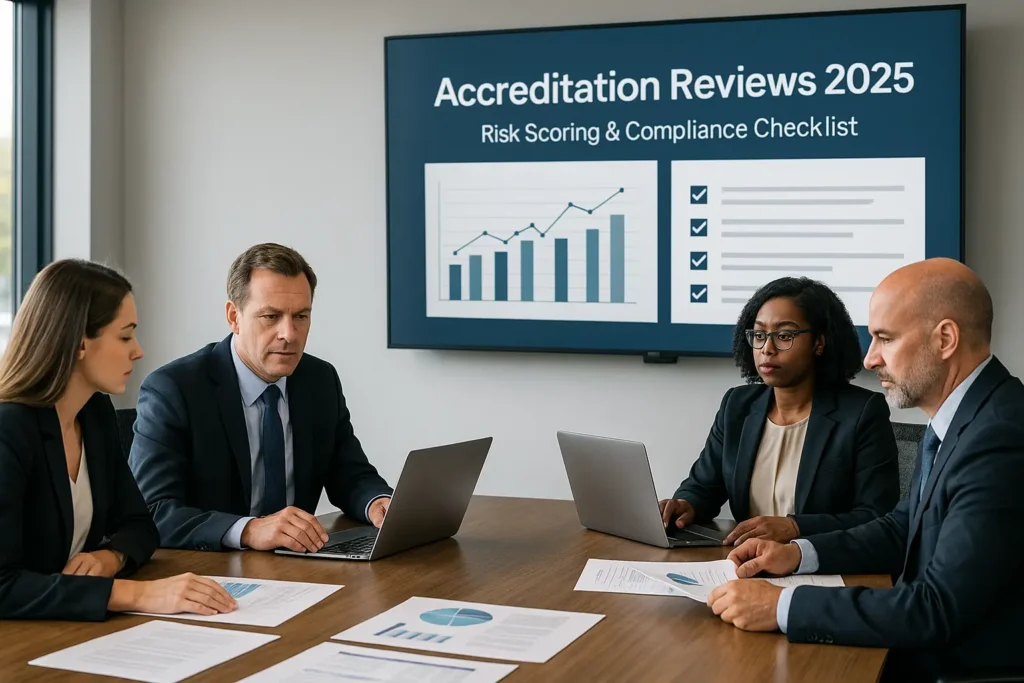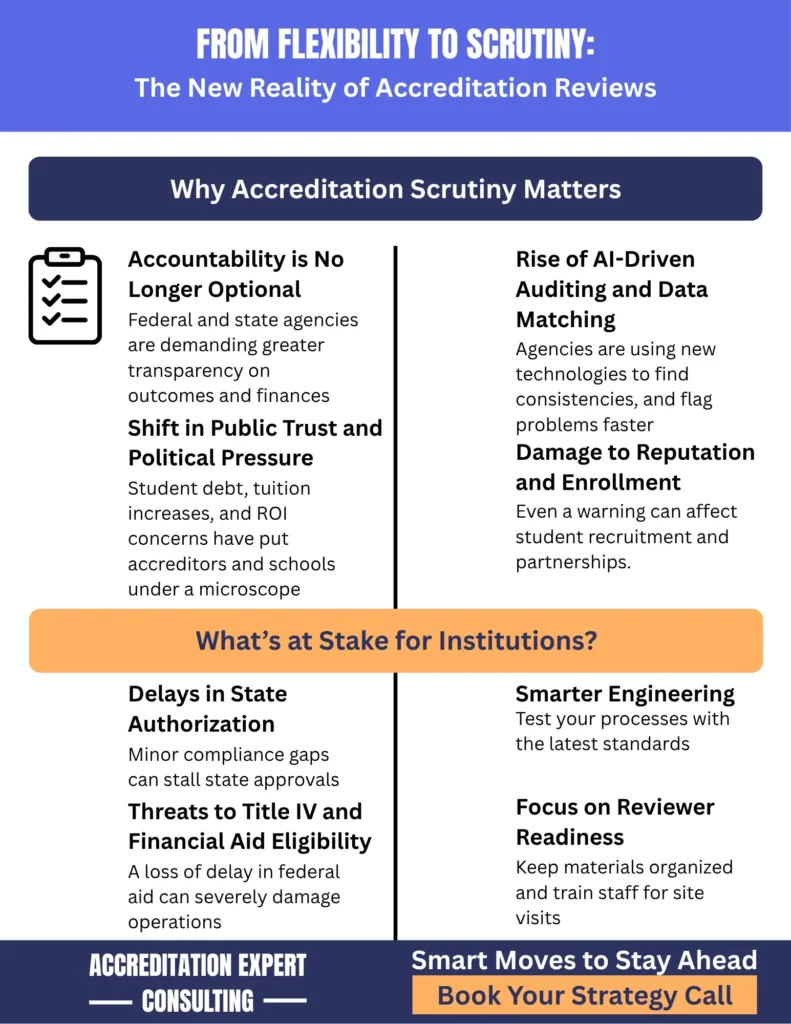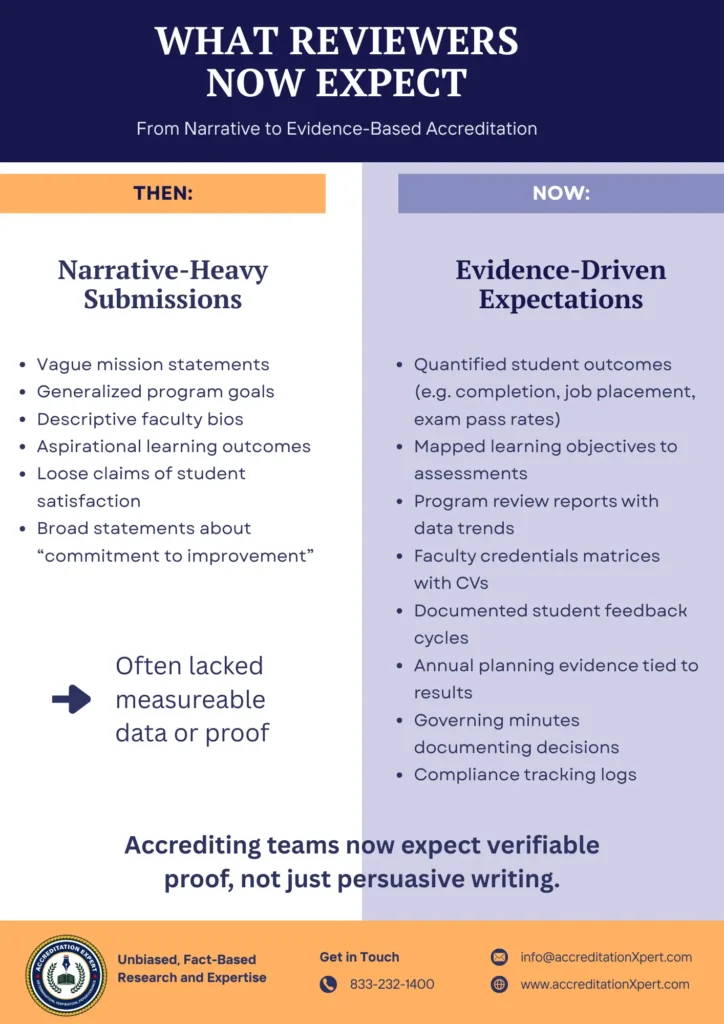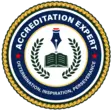
Higher education institutions once relied on a generous margin of flexibility in their accreditation reviews. Those days are fading fast. In 2025, schools will face a landscape of heightened oversight, rapidly evolving standards, and more severe consequences for even minor missteps. This article examines why this shift is significant now, what drives it, and how compliance leaders can stay ahead.
Why Accreditation Scrutiny Is Tightening in 2025
Accountability Is No Longer Optional
Federal and state agencies are demanding greater transparency on student outcomes, financial stability, and institutional quality. The U.S. Department of Education’s renewed focus on enforcement is pushing accreditors to strengthen their own review processes. For college leaders, this means that casual or outdated approaches to compliance will no longer pass.

Shift in Public Trust and Political Pressure
Increased tuition, growing student debt, and concerns about ROI have put institutions under a microscope. Accreditation bodies are under pressure to demonstrate that their reviews are rigorous, equitable, and focused on genuine student success. Institutions must now demonstrate meaningful learning outcomes, graduation rates, and employer relevance to retain good standing.
Rise of AI-Driven Auditing and Data Matching

Thanks to advances in artificial intelligence, accrediting agencies can now cross-check data sources more efficiently and thoroughly. Expect site visits to come with algorithm-based risk scoring, automated catalog reviews, and pre-audit data mining, changing the game for traditional document prep.
What’s at Stake for Your Institution

Delays in State Authorization and New Program Approvals
The link between accreditation standing and state authorization is tighter than ever—and institutions are feeling the pressure. When an accrediting agency issues even a minor compliance flag, it can trigger a domino effect that delays approvals from state regulatory bodies. This is especially critical for institutions looking to launch new programs, establish additional locations, or expand into distance education . State agencies increasingly rely on accreditation status as a benchmark for institutional readiness, financial stability, and quality assurance. Any unresolved deficiencies or late filings can stall your expansion timeline by months, or even force you to withdraw applications altogether. For mission-driven colleges seeking to grow responsibly, the message is clear: maintaining a clean accreditation record is not just a best practice, it’s a strategic necessity .
Threats to Title IV and Financial Aid Eligibility
Accreditation isn’t just a compliance box; it’s a financial lifeline. When an institution loses accreditation or is placed under heightened monitoring, the ripple effect extends far beyond reputational damage. Title IV eligibility, which governs access to federal financial aid programs such as Pell Grants, Direct Loans, and Federal Work-Study, can be immediately jeopardized. For many colleges and universities, particularly those serving low-income, first-generation, or adult learners, federal aid constitutes a significant portion of their operating revenue. A loss or delay in Title IV access can lead to enrollment declines, cash flow disruption, staffing cuts, and, in extreme cases, suspension of academic offerings or institutional closure. Even being placed on warning or probation status can trigger additional reporting requirements, lender hesitation, and student withdrawal. For leadership teams, the message is clear: ensuring compliance with accreditation standards is not just about oversight, it’s about protecting the core funding mechanisms that keep your institution viable and your students enrolled.
Damage to Reputation and Enrollment
In an era of online reviews and federal watchlists, an accreditation warning can be devastating to brand credibility. For prospective students and partners, perception equals reality.
Smart Moves to Stay Ahead of Accreditation Trends

Conduct Internal Mock Reviews
Before accreditors do it for you, conduct your own comprehensive review using the latest standards. Our accreditation services team builds custom internal audits that mirror current expectations.
Align Curriculum with Workforce Relevance
Don’t wait for an accreditor to ask how your programs prepare students for jobs. Build clear pathways from classroom to career, and document employer engagement. Our enrollment strategy consulting services help you close this gap.
Strengthen Your Institutional Effectiveness Model
Integrate data across academics, finance, student services, and operations. Create visual dashboards and real-time tracking. Use these to feed both internal decisions and external reports.
Focus on Reviewer Readiness
Many institutions lose points not due to gaps in quality, but because their materials are disorganized or outdated. Train your team to think like reviewers. Our state licensing support packages include document prep, catalog alignment, and faculty file audits.
Accreditation Reviews 2025

Real-World Takeaway
One client, an online graduate school, faced a mid-cycle visit after several student complaints. Our team helped them reorganize their self-study files, correct outdated disclosures, and build a new outcomes dashboard. The result? Full reaffirmation with zero findings.
This is no longer about checking boxes. It’s about building systems that demonstrate continuous quality. Institutions that plan ahead and embrace transparency will not only survive these reviews; they’ll thrive.
FAQs
What triggers a surprise accreditation review?
Student complaints, financial instability, low outcome metrics, or leadership changes can trigger mid-cycle reviews.
Can we still open a new campus if we’re on probation?
Not without approval. Most agencies will pause substantive change approvals for institutions under any form of warning.
How often should we run an internal mock audit?
Annually, at a minimum. Before any scheduled site visit, conduct a full mock audit six months prior.
Does accreditation affect online-only programs differently?
Online programs are now under closer scrutiny, especially regarding student verification, contact hours, and instructional equivalency.

Accreditation Expert Consulting – Unbiased, Fact-Based Research and Expertise



